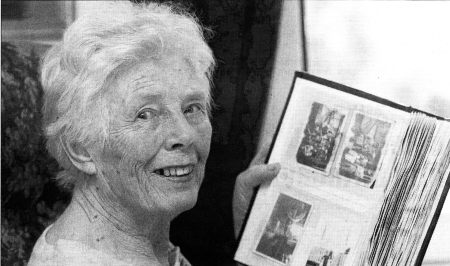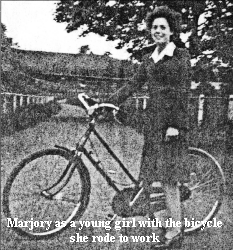|

Marjory Wilson looks through old photos of
herself and family at work in the Mill. US4407-521CO
IT WAS just last year that Hilden Mill fell
silent for the last time.
And the occasion brought back many memories for local writer
Marjorie Wilson, who in an autobiographical story 'Stark
Reality', gives an insight.
The story describes Marjory's first day as an
employee of Hilden Mill at the age of just 14 - a stark contrast
to how teenagers live today.
As a young girl I stood on the bridge
spanning the 'Wee Race' and gazed along the towpath leading to
Barbour's Mill.
The only break on the horizon was a lone
tree, named the '40 yard' tree.
Was it 40 yards from the bridge to the tree?
I didn't know but I presumed that was the answer.
The cold crept through me, making my walk
stilted. A need not to be late for my first day forced me to
move quickly. You had to be at your work before the Mill horn
blew or you were locked out.
Fear lent wings to my feet, overcoming the
cold penetrating my bones.
The 'Thread Shop' was considered to be a
clean job, embroidery thread being one of its main products. The
boss was a hard man who ruled with a stern manner and a face
never known to smile.
I had time to reflect as I took off my coat:
"Why was I here? My parents had not forced me out to work, it
just seemed the thing to do when you became 14 and left school.
"Friends of mine were going to Technical College but no one at
home had suggested I take the examination so the opportunity had
passed me by.
Now I was a 'mill girl'. It would have been lovely if I had
been going to work in a shop or do something glamorous like
being a film star or singing on the stage. These were only
dreams which at this moment seemed to belong to another world.
I looked across the dark room to a row of
strange faces gazing at me. I wished I had worn something of my
own.
The coat I wore was a good one with a fur
collar, but it was my Aunt Aggie's and felt too old for me.
Everyone had told me it fitted like a glove and was very smart
but I hated it.
Not wanting to hurt anyone's feelings, I had
kept my mouth shut. They weren't to know of tears shed in the
privacy of my bedroom.
I had thrown the coat on the floor and
stamped on it. Later feeling ashamed, I tenderly picked it up
and stroked the fur collar.
Aunt Aggie was one of my favourites, always
kind, singing her way through life.
Rock
Though crippled by Arthritis, no one had ever
heard her complain. Aggie was the rock the family leaned on. She
was the youngest of daddy's sisters, known in the family as the
'Big Four', due to their small stature in comparison to their
four brothers. "This is Maggie your forewoman," snapped the tall
thin man who towered above me.
Maggie gave me a timid smile and took me to
the work bench. It had a high stool with a steel bar in front of
it. When I sat on the stool my feet didn't touch the ground but
at least I was sitting which helped my legs to stop shaking.
Later, a need to go to the toilet was frowned
upon and a watch appeared in the boss's hand.
With down-cast eyes I returned to my stool. A
new nightmare awaited. The workers all owned cans which held
their tea leaves and sugar and my job was to take them to the
boiler and fill them with water. Terrified of scalding my legs
I. held the cans out as far as possible.
 It seemed like a year since I had left home that morning. It was
bad enough starting work at 7.30am. But having to wait until six
o'clock when the sound of the horn blowing announced the end of
the working day seemed to stretch forever. It seemed like a year since I had left home that morning. It was
bad enough starting work at 7.30am. But having to wait until six
o'clock when the sound of the horn blowing announced the end of
the working day seemed to stretch forever.
The only good thing about the whole day was
Maggie, who, though terrified as she was of the boss, never the
less had been kind to me. I discovered we both belonged to the
same church and a bond was made to help me get through the long
days and months which stretched ahead.
At last it was time to go home. The lovely
'40 yard tree' seemed to welcome me.
The family started to make the evening meal,
but not before I had kicked off my shoes.
Never in my life had I felt so tired. Now I
had time to reflect on the life mother and father had faced in
the Mill since they had left school.
In father's day, they had to work from age 11
and still they smiled. Maybe I would smile again but at that
moment all I wanted to do was go to my bedroom, have a cry and
go to bed.
Yesterday it had seemed exciting to leave
school and go to work. Today there was no joy. Not even the
thought of 25 shillings on Saturday brought me any comfort.
I gazed at my image in the mirror. Mother's
voice still rang in my ears: "You are now a woman love."
Hope
My only hope was to be a woman as good as my
kindly mother.
The seat beside me (at work) was soon occupied
by Alice Flanagan. Alice was one of my friends from school and
we joined forces to overcome the tedium of mill work.
Annie McClurg (next door neighbour of Alice
in Victory Street) also became a firm friend.
Annie gave advice on everything a young girl
would want to know. She taught me how to write love letters and
also understand the meaning of S W A L K on envelopes.
Her cheery nature helped me in dealing with
the boss. He was a neighbour of hers and she knew the kind man
behind the stern exterior.
I think my first boyfriend must have been
very surprised by poems quoted by Anne and written by me in my
first letter. He must have thought his 14 year old girlfriend
was very experienced.'
Ulster Star
09/11/2007
 |